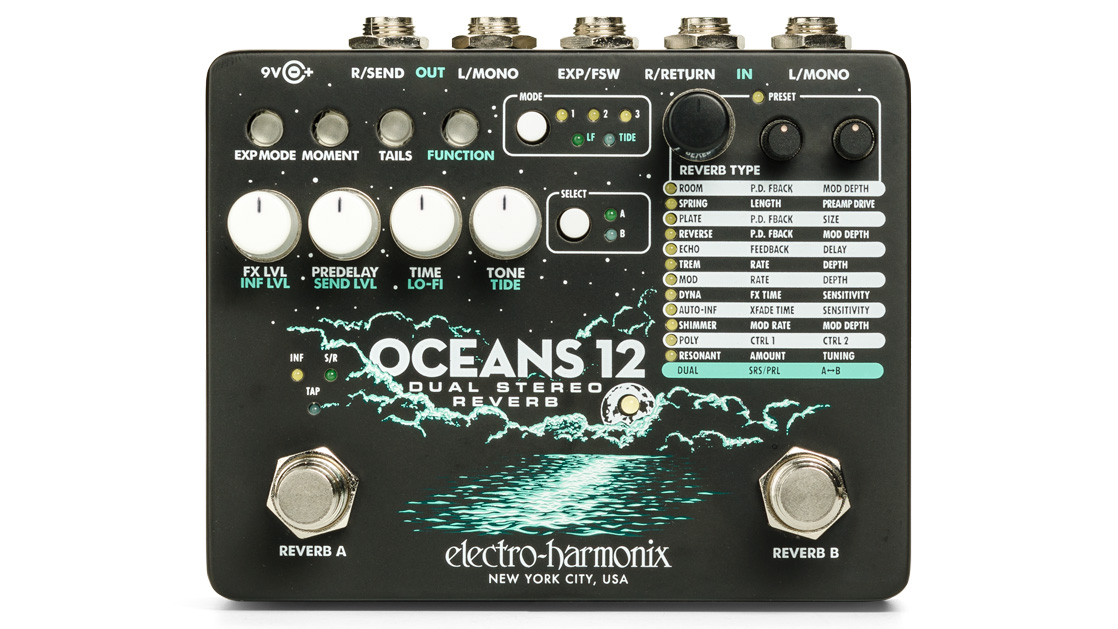Electro-Harmonix just announced its most advanced reverb pedal ever - meet the Oceans 12
With two separate reverb engines, could this be the ultimate reverb for shoegaze and ambient players?
Since its release in 2018, the Electro-Harmonix Oceans 11 has become a pedalboard staple for many guitarists - we even named it one of the best reverb pedals you can buy today - and now EHX has taken it to the next level with the Oceans 12.
The Oceans 12’s killer app is two entirely independent stereo reverb engines, which allows you to run two reverbs at the same time - a massive boon for players who exploit EHX’s killer pitch-shifted shimmer sounds.

These dual reverbs can be run in series or parallel, making for extreme stacked reverbs or lush short and long-decay combos, while advanced I/O options mean you can send reverbs to separate channels, or send/return for pre- and post-reverb control.
EHX has also generously added the Oceans 11’s secondary knob functions to the front of the pedal, as well as new controls for Tide (stereo image alteration) and Lo-Fi, an expression/footswitch jack and 24 presets.
Elsewhere, there’s a tails switch to control the reverb bypass fade, while the left footswitch can be used to activate infinite, tap or send/return functions.
True to its name, the Oceans 12 adds one additional reverb type over the Oceans 11’s, um, 11: Resonant. You can see the full list below:
- ROOM – two modes: reverb algorithms modeled after a lively room and a spacious performance hall
- SPRING – two modes: vintage 1962 Fender® 6G15 tube reverb emulation and the spring algorithm from the EHX Holy Grail
- PLATE – two modes: two emulations of the smooth, metal plate reverb often used in high-end recording studios during the 1960s and ‘70s
- REVERSE – two modes: a reverse reverb effect as well as true reversed echoes
- ECHO – three modes: a digital delay with various echo rhythms feeding into a plate reverb
- TREM – three modes: a classic, periodic volume envelope with various shapes applied to both the wet and dry mix of a hall reverb
- MOD – three modes: combinations of chorus and flange reverbs that create rich reverb tails
- DYNA – three dynamic, experimental reverb algorithms: swell, gate and duck
- AUTO-INF – three modes: auto-infinite reverb (w/optional chorus or flange) that “listens” to your playing and crossfades to a new reverb wash upon detection of newly struck notes.
- SHIMMER – two modes: two configurations of a rich octave-shifted reverb wash
- POLYPHONIC – two modes: two configurable bi-directional pitch shifts that add dimensionality to the reverb tail
- RESONANT – two modes: reverb excited by tunable resonators and configurable self-oscillating filters on the reverb tail
Shoegaze and ambient players are going to lap this up, like the figurative reverb ocean and the aural shore. Ahem.
Get The Pick Newsletter
All the latest guitar news, interviews, lessons, reviews, deals and more, direct to your inbox!
The Oceans 12 is available from mid-March for $237, including a 9V power supply. See EHX for more.

Mike is Editor-in-Chief of GuitarWorld.com, in addition to being an offset fiend and recovering pedal addict. He has a master's degree in journalism from Cardiff University, and over a decade's experience writing and editing for guitar publications including MusicRadar, Total Guitar and Guitarist, as well as 20 years of recording and live experience in original and function bands. During his career, he has interviewed the likes of John Frusciante, Chris Cornell, Tom Morello, Matt Bellamy, Kirk Hammett, Jerry Cantrell, Joe Satriani, Tom DeLonge, Ed O'Brien, Polyphia, Tosin Abasi, Yvette Young and many more. In his free time, you'll find him making progressive instrumental rock under the nom de plume Maebe.
“Our answer to everything players have asked for and more”: Neural DSP’s Nano Cortex had one major drawback – but now it’s been addressed with a huge free firmware update that takes on Kemper and TONEX
"The ability to use this as a midweight MIDI brain for a gigging setup is what makes it unique.": Walrus Audio Canvas Clock review










